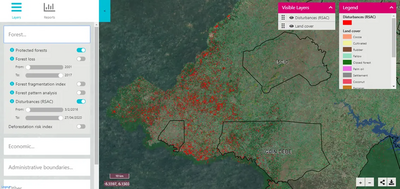Report of LIBG forum on deforestation
How to stop deforestation
A recent webinar discussed policy, a market intervention and monitoring technology to help stop deforestation
By Imaduddin Ahmed
The Liberal International British Group together with the Paddy Ashdown Forum organised a webinar on 27 April 2020 hosted by BrightTALK on how to stop deforestation. 428 people registered for the event from around the world. The aim of the discussion was to learn how to stop deforestation in a socially just manner, given that the largest rainforests exist in parts of the world that are economically lagging developed nations that have already denuded their natural environments of tree cover.
Jon Shepard, a director at Global Development Incubator, explained why we should care about deforestation: forests absorb a third of global carbon dioxide emissions. A quarter of CO2 emissions are absorbed by oceans. The rest goes into the atmosphere, acting as a greenhouse gas, causing global warming and the climate crisis.
The destruction of forests has also been associated with a rise in zoonotic pandemics. Olivero et al (2017) showed in Nature Scientific Reports that destroyed forests with closed canopies in Africa resulted in outbreaks of Ebola, with a lag of two years. The Ebola virus has been associated with increased interaction between bats and humans when bats lose their natural habitats. The COVID-19 virus has also been associated with bats.
Duncan Brack, an advisor to the UK government's Global Resource Initiative Task Force, explained that agriculture is the main driver of forest loss in the tropics. Consumer-country demand for commodities such as tropical timber, beef, soy, palm oil, rubber, cocoa and coffee, wood pulp all drive deforestation; for most of these, the Asia-Pacific region accounts for the bulk of consumption, but Europe and the US are both important sources of demand.
Duncan and Yulia Stange, a manager at ClientEarth, offered law-based solutions to curb consumer-based deforestation. These included
- the EU Forest Law Enforcement, Governance and Trade (FLEGT) Action Plan to stop the import of illegal timber and address governance weaknesses;
- Voluntary Partnership Agreements between the EU and timber-exporting developing countries to create timber legality assurance and export licensing systems designed to exclude illegal timber from consume markets, improve forest governance and support local populations; this same model could potentially be applied to other commodities such as cocoa;
- social agreements between communities local to forests and logging companies;
- due diligence regulation for businesses, either through a commodity-specific approach such as the EU Timber Regulation, or a broader corporate approach, applying to a company's entire operations and supply chains such as the French Devoir de Vigilance law of 2017;
- public procurement policy to include sustainability criteria.
There is a mechanism within the EU Withdrawal Agreement for the UK to transpose EU FLEGT into UK Timber Regulation. There is also movement for the UK entering Voluntary Partnership Agreements that it had initially entered as a Member of the EU.
Complementing government-to-government agreements and domestic policy in consumer countries are market interventions to correctly value standing forests and disincentivise their destruction for quick and little profit.
Jon Shepard talked about how non-profit organisations such as Emergent monetise the difference in CO2 emissions that would have been produced had a forest been burned and then used for agriculture and the emissions that would been naturally sequestered into the soil had a forest been left unharmed.
After verifying the counterfactual emissions, they create "carbon credits" - a function of a dollar value and reduced carbon dioxide by square metre - and then sell those to large corporations which want to offset their emissions and become carbon neutral.
This allows corporations such as Microsoft to offset their historic emissions. The proceeds of the sale are then transferred to the forest nations to compensate them for not using the land for short-term economic gains. Emergent's scheme has been underwritten by the Government of Norway as a buyer of last resort.
Both government and market interventions require monitoring. Paola Despretz, an economist at Vivid Economics, shared her experience on the UK Space Agency-funded programme to tackle deforestation in Côte d'Ivoire using satellite images to detect forest loss on a fortnightly basis.
Deforestation alerts are used to identify and destroy illegal incursions of cocoa farming in protected areas. Thanks to the online forest monitoring platform, IMAGES, the rate of deforestation in certain areas of Côte d'Ivoire has reduced substantially since 2017.

Left: Vivid Economics' satellite early warning system for Cote d'Ivoire'.
*Imad Tweets @ImadAhmed. He is on the Academic Board of the Paddy Ashdown Forum and an Executive Member of Liberal International British Group and an economist at Vivid Economics. He has written this in his own capacity and views expressed are his own.
